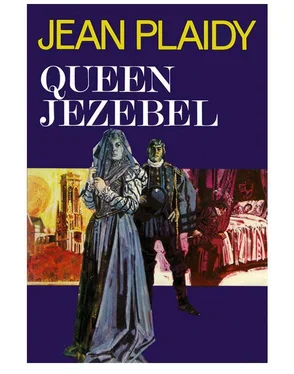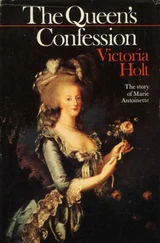Виктория Холт - Queen Jezebel
Здесь есть возможность читать онлайн «Виктория Холт - Queen Jezebel» весь текст электронной книги совершенно бесплатно (целиком полную версию без сокращений). В некоторых случаях можно слушать аудио, скачать через торрент в формате fb2 и присутствует краткое содержание. Жанр: Исторические любовные романы, на английском языке. Описание произведения, (предисловие) а так же отзывы посетителей доступны на портале библиотеки ЛибКат.
- Название:Queen Jezebel
- Автор:
- Жанр:
- Год:неизвестен
- ISBN:нет данных
- Рейтинг книги:4 / 5. Голосов: 1
-
Избранное:Добавить в избранное
- Отзывы:
-
Ваша оценка:
- 80
- 1
- 2
- 3
- 4
- 5
Queen Jezebel: краткое содержание, описание и аннотация
Предлагаем к чтению аннотацию, описание, краткое содержание или предисловие (зависит от того, что написал сам автор книги «Queen Jezebel»). Если вы не нашли необходимую информацию о книге — напишите в комментариях, мы постараемся отыскать её.
Queen Jezebel — читать онлайн бесплатно полную книгу (весь текст) целиком
Ниже представлен текст книги, разбитый по страницам. Система сохранения места последней прочитанной страницы, позволяет с удобством читать онлайн бесплатно книгу «Queen Jezebel», без необходимости каждый раз заново искать на чём Вы остановились. Поставьте закладку, и сможете в любой момент перейти на страницу, на которой закончили чтение.
Интервал:
Закладка:
‘But you have nothing to fear, my love.’
‘I do not know, Nurse. Why cannot my subjects be at peace? I care for them all, be they Huguenots or Catholics. Why, you yourself are a Huguenot.’
‘I wish that you would pray with me, Chariot. There would be great comfort for you in that.’
‘Perhaps I will one day, Madelon. But it is all this hate about me that frightens me. Monsieur de Guise hating my dear Admiral, and the Admiral cold and haughty with Monsieur de Guise. That is not good, Madelon. They should be friends. If those two were friends, then all the Huguenots and all the Catholics in Paris would be friends, for the Catholics follow the Duke, and the Huguenots the Admiral. That is it! That is what I must do. I must make them friends. I will insist. I will demand it. I am the King. By the good God, if they will not give each other the kiss of friendship, I will . . . I will . .
Madeleine wiped the sweat from his brow. ‘There! You are right, my little King. You are right, my Chariot. You will insist, but now you will rest awhile.’
He touched her cheek lightly with his lips. ‘Why are not all the people in Paris gentle like you, dearest Nurse? Why are they not all like Marie and my wife?’
‘It might be a dull world made up of such as I,’ she said.
‘A dull world, you say. Then it would be a happy one. No fears . . . no death . no blood. Go, Nurse darling, go and tell Marie to come, and I will talk to her and see what she has to say about a friendship between Monsieur de Guise and Monsieur l’Amiral.’
Catherine’s benign expression hid the cynicism she felt as she witnessed the farce which was now being enacted before her.
The kiss of peace which Henry of Guise was giving Coligny! Her mind went back to a similar scene which had taken place six years before in the château at Blois. She herself had organized that scene and with the two same actors. Of course, at that time Guise had been a boy, completely without subtlety, unable to hide the blushes which rose to his cheeks, unable to quell the fire in his eyes. Then he had said: ‘I could not give the kiss of friendship to a man who has been called my father’s murderer.’
How the years change us! she thought. Now this. Duke—no longer a boy—was ready to take the Admiral in his arms and plant on his cheeks the kisses of friendship, even while he was plotting to kill him.
‘How good it is,’ murmured Catherine ‘when old enemies become friends!’
Madame de Sauves, who happened to be near her, whispered: ‘Indeed yes, Madame.’
Catherine allowed herself to smile graciously on the woman. She was playing her part well with the bridegroom, playing both the seductress and the virtuous wife. Catherine had said: ‘The Baron de Sauves would be proud of his wife if he could see the way in which she repulses that young rake of Navarre.’ At which the woman had smiled demurely and lifted those wonderful blue eyes of hers to the face of the Queen Mother, as though asking for fresh instructions. But there were no further instructions . . . yet.
Catherine was seriously worried. That old fool, the Cardinal of Bourbon, was hedging. He could not, he declared, perform the ceremony until he had the Pope’s consent. And how could he receive word from the Pope when Catherine herself had arranged that no mail should come from Rome! She and Charles would have seriously to threaten the old man if he held out much longer.
He could be coerced, she was sure. He was getting old now, and, after all, he was a Bourbon. His brothers had not been noted for their strength. Both Antoine de Bourbon and Louis de Condé, brothers of the Cardinal, had been successfully tempted from the path of duty by members of Catherine’s. Escadron . Not that the Cardinal could be seduced in that way; but there were other methods.
And when he had consented, it would be necessary to let the people of Paris believe that the Pope had agreed to allow the marriage to take place. That would be simple.
But still she was worried. The grey shadow which haunted her life seemed more ominous than ever—that man who had been her son-in-law. In his gloomy Escorial he would be aware of all that was happening in France, and if he did not like what happened he would blame the Queen Mother. His ambassadors were spies and she was well aware that they sent long accounts of her, activities to their master.
Alva had sent a special agent to inquire into her intentions. She admitted that in Spain’s eyes she must appear as an enemy. There was an alliance with England, recently signed; she was trying hard to bring about the marriage of her son Alençon with Elizabeth of England.; there were signs that Coligny had almost .persuaded the King to keep his word and support the Netherlands against Spain and now there was the marriage of the Princess of France with the Huguenot Navarre. She doubted not that Philip of Spain was thinking of war . . . war with France; and a war, with Spain’s powerful armies and mighty armadas, was the bogey which haunted Catherine’s days and nights. She saw in it disaster—disaster to herself and her sons, and that which she dreaded more than anything on Earth, the fall of the House of Valois. To keep her sons on the throne she had followed a devious policy, twisting this way and that in order to seize every advantage, never sure today which way she would go tomorrow, supporting Catholics, favouring Huguenots, so that with good reason they likened her to a snake, with poisonous fangs, since, when she schemed for the sake of the House of Valois, she did not hesitate to kill.
She remembered a conversation which she had had at Bayonne, whither she had gone in great state to meet her daughter, the Queen of Spain; but more important than her encounter with her daughter had been that with the Duke of Alva, deputy for Philip, with whom she had had that important conversation.
Then it had been necessary to make promises, to declare herself a staunch Catholic, and she had begged Alva not to be misled when for purposes of policy she appeared to support their enemies. She had offered Alva the heads of all the Huguenot chiefs—but at the right moment. ‘It must happen,’ she had said, ‘as though by accident, when they are gathered in Paris; for what reason, as yet we cannot say.’
She wanted this marriage between the King of Navarre and her daughter because she knew that any power she enjoyed in France must come to her through her children. In the event of a civil war, resulting in a victory for the Huguenots, the crown of France might be placed on the head of the Bourbon King of Navarre; the daughter of Catherine de’ Medici would then be the Queen of France. Catherine need not, therefore, lose her position as Queen Mother. She would, naturally, do all in her power to prevent such a calamity overtaking the House of Valois; she would not hesitate to use assassins or the deadly morceaux . But it was well to consider all eventualities. Margot would not be so easy to control as Charles had been and as she hoped her beloved Henry would be; but she would still be Catherine’s daughter. This marriage then was an insurance against possible future mishap, for Catherine had seen great Huguenot victories in her time; and the sight of all those followers of Coligny—Téligny, Rochefoucauld, Condé, and young Navarre—confirmed her opinion that she was wise in changing her course as it suited her.
The marriage must take place soon, although afterwards it would be imperative and urgent to pacify Philip of Spain; and if she were fortunate it might be that the murder of Coligny, whose death His Most Catholic Majesty had long desired, would be sufficient to satisfy him. And if not? Vividly there came to her memories of that conversation with Alva at Bayonne. the right moment . . . when all the Huguenots are gathered in Paris on some pretext or other . . .
Читать дальшеИнтервал:
Закладка:
Похожие книги на «Queen Jezebel»
Представляем Вашему вниманию похожие книги на «Queen Jezebel» списком для выбора. Мы отобрали схожую по названию и смыслу литературу в надежде предоставить читателям больше вариантов отыскать новые, интересные, ещё непрочитанные произведения.
Обсуждение, отзывы о книге «Queen Jezebel» и просто собственные мнения читателей. Оставьте ваши комментарии, напишите, что Вы думаете о произведении, его смысле или главных героях. Укажите что конкретно понравилось, а что нет, и почему Вы так считаете.












